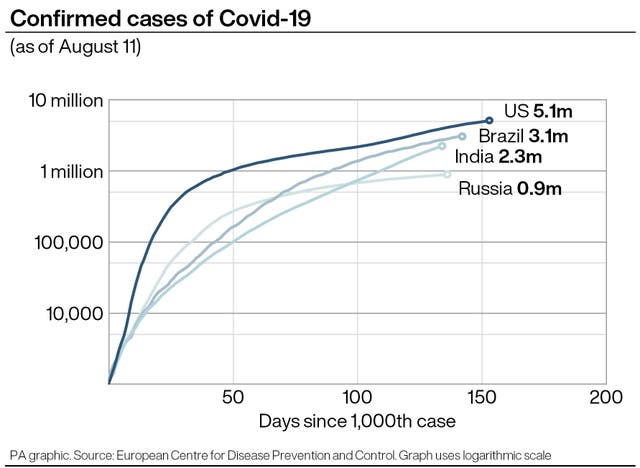
The announcement on Tuesday by Russian president Vladimir Putin that his country was the first to approve a coronavirus vaccine has been met by doubts about the science and safety.
But it also underscored how the competition to have the first vaccine is about international rivalries as well as science.
The first nation to develop a way to defeat the novel coronavirus will achieve a kind of moonshot victory and the global status that goes along with it.
That is valuable to Mr Putin, whose popularity at home has declined amid a stagnant economy and the ravages of the virus outbreak.

“To be the first one out of the block with a coronavirus vaccine would be a real — pardon the pun — shot in the arm for the Kremlin,” said Timothy Frye, a political science professor at Columbia University who specialises in post-Soviet politics.
Certainly, Russia is not alone in viewing a vaccine in this light.
China, where the virus first emerged, has also raced to make progress on a vaccine.
A state-owned Chinese company is boasting that its employees, including top executives, received experimental shots even before the government approved testing in people.
And president Donald Trump, whose handling of the coronavirus pandemic has put his political fate in grave jeopardy, is hoping to get credit for his government’s aggressive push for a vaccine.
It is far from clear at this point whether Mr Putin has beaten Mr Trump to this medical milestone.
Mr Putin said the Health Ministry gave its approval after the vaccine underwent the necessary tests and said one of his two adult daughters had been inoculated.
“We should be grateful to those who have taken this first step, which is very important for our country and the whole world,” he said.
No proof was offered and scientists in Russia warned that more testing would be necessary to prove it is safe and effective.
Nonetheless, officials said vaccination of doctors could start as early as this month and mass vaccination may begin as early as October.
Scientists around the world have been cautioning that even if vaccine candidates are proven to work, it will take even more time to tell how long the protection will last.
“It’s a too early stage to truly assess whether it’s going to be effective, whether it’s going to work or not,” said Dr Michael Head, senior research fellow in global health at the University of Southampton.

It was also too soon to dismiss the Russian claim out of hand.
The country, though economically dependent on the export of natural resources, does have a history of achievement in science, medicine and aerospace — including becoming the first to put a person into space, in 1961.
“It is possible that they concentrated and could do this,” said Daniel Fried, a retired senior US diplomat.
“I’m not scoffing at it, but it doesn’t mean that the Russian economy is advanced.”
A vaccine would be the kind of significant achievement that would elevate Mr Putin at home and in the international community.
It is also possible Russia had help.
The US, Britain and Canada last month accused hackers working for Russian intelligence of trying to steal information about a coronavirus vaccine from academic and pharmaceutical research institutions.


Comments: Our rules
We want our comments to be a lively and valuable part of our community - a place where readers can debate and engage with the most important local issues. The ability to comment on our stories is a privilege, not a right, however, and that privilege may be withdrawn if it is abused or misused.
Please report any comments that break our rules.
Read the rules hereLast Updated:
Report this comment Cancel